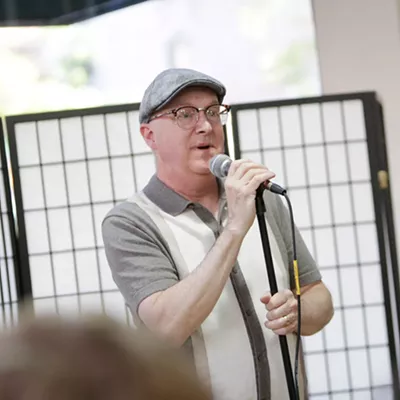When I look at my college diploma, matted in a $200 frame on my wall, I feel nothing. Four years of spreading myself too thin, taking classes and extra activities I thought would guarantee me a job. It worked for a while. Then the economy bombed and my job was gone. So I took a lower-paying job only to be laid off. Again. Just nine months later.
The past few months, I’ve spent my days working in retail hell and interning for The Inlander. I walk out of interviews feeling the high of a job well done — and then the lows of the “We regret to inform you…” phone calls.
But of course, I’m not the only one. For those coming out of school, finding work utilizing their degree — while nationwide unemployment hovers at 10 percent — has been next to impossible.
According to the National Association of Colleges and Employers, only 20 percent of college graduates were hired following graduation in 2009, as compared with 26 percent in 2008 and 51 percent the year before that.
On a recent Tuesday afternoon, when we should be working, I enjoy a coffee with another unemployed college graduate.
Rachael Gewock earned her bachelor’s degree in education at the University of Idaho. Despite flooding schools across the United States with her resume, she has nothing to show for it. Gewock took on two jobs after college, neither having anything to do with her degree; she was working seven days a week. Wanting to actually use her degree, she took a massive pay cut to substitute-teach for the Mead and Deer Park School Districts. But subbing never guarantees a regular income. Usually, Gewock makes less than $1,000 to cover an entire month’s worth of bills. This December, when winter break kicked in, she brought home only $186.
As we mooch the free wi-fi at the cafe, Rachael admits that she recently deferred her student loans and decided to accept food stamps in order to cover her bills. She doesn’t look up from her mocha when the phrase “food stamps” leave her mouth.
“It’s embarrassing,” she says. “Totally depressing. When I went and stood in line for them, I felt like I shouldn’t be there. Others deserve it more than me. I thought going to college would never put me there, but it did.”
Without a doubt, college graduates in the past two years have gotten the shaft when it comes to finding jobs. Facing such an unstable economy, local universities are stepping up their career development resources in hopes that graduates will find the connections they need to the jobs they deserve. For most, this means boosting networking opportunities between undergraduates and alumni and using social networking sites like Facebook.
Prompted by the ailing job market, EWU implemented a community-wide conference called “Work It!” The conference, which happens in May, brings employers from around the region to speak about green jobs, good interview skills, résumé building and more.
Over at Gonzaga, career development means exposing students to different cities by embarking on “City Treks,” during which students participate in job fairs outside Spokane. The program, which has taken place in Portland and Seattle, heads to San Francisco this spring.
But for more and more graduates, the best way to not be a failure in the job market is to head back to school. Colleen Mallon, director of the MBA program at Gonzaga, has witnessed a 30 percent increase in MBA applicants for this spring. Which makes sense, she says.
“An MBA can open up a wider range of job opportunities students never thought to look for,” she says. “And it gives them an edge.”
At North Idaho College, total enrollment is up 20 percent from last spring, with 1,000 more students on campus. The college also added more general education classes in subjects like math, English and psychology. For those looking to face the wrath of the economy, Eric Murray, vice president of Student Services at NIC, says to broaden your horizons.
“Be willing to move and look regionally for jobs,” Murray says. “Have a career goal in mind and contact employers in that field.”
Landing that dream job out of school will take time. Virginia Hench, associate director of the EWU Career Center, recommends attending local launch pad events, joining professional groups in your field, doing volunteer work or an internship following college — and most important, making a business card to hand out, even if you don’t have a job.
Knowing your strengths and being able to clearly articulate them in a networking situation, Hench insists, will eventually lead you to the starting line of a career. Hench says students should anticipate going above and beyond to find a job in this market.
For University of Idaho graduate Doug Taylor, that meant staying in school to get a master’s in electrical engineering. And it paid off. Taylor scored a job immediately after graduation. But for Taylor, a master’s had always been on his list of goals.
“My undergrad education was just the tip of the iceberg of what I was studying. Luckily in the engineering field, the economy hasn’t quite taken its toll. There haven’t been a lot of layoffs. So I wasn’t too afraid about finding a job.”
But it won’t be that easy for everybody. “It’s a really sobering time,” says Hench. “Students now have to compete with people who were laid off. You can’t go to Craigslist or Monster.
com and expect to find jobs anymore. There is no room for error.”
Jessica McCabe, a former Inlander intern, is still looking for work.















